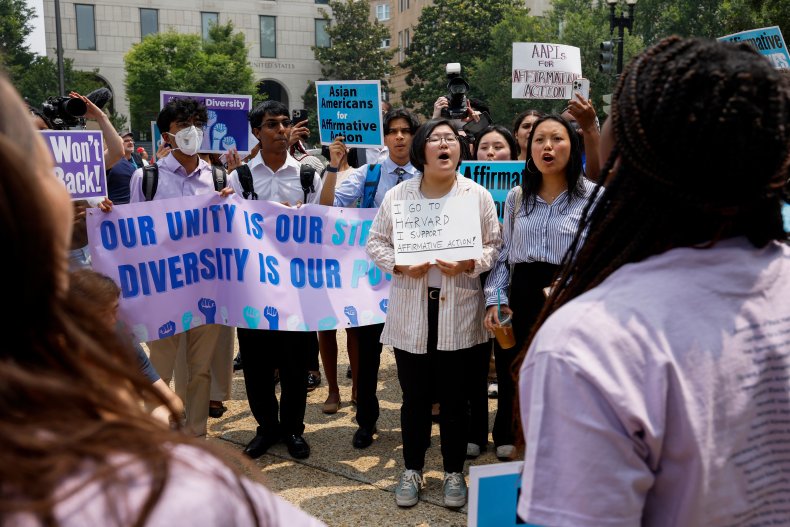Minorities who as a whole will soon be nationally impacted by the Supreme Court's decision to strike down affirmative action in college admissions argue that legacy admissions will lead to an even wider gap between the privileged and everyone else.
The decision announced Thursday focused on two cases involving Harvard University and the University of North Carolina Chapel Hill, brought forward by Edward Blum's conservative nonprofit organization, Students For Fair Admissions. Justice John Roberts wrote in the opinion that the universities' policies violated the Equal Protection Clause of the 14th Amendment.
Even though numerous recent polls indicated near majority support from Americans of all spectrums, from political affiliations to gender to income levels, against the use of race as a factor in admissions. But opponents of the nixing argue that this could also impact government programs, scholarships and financial aid, and hiring practices at private companies.
Now, legacy admissions—or the admission of a student based on their familial relationship to an alumni member—are under fire by some on social media.
"It's propping up the exact same systems of inequality that really our country should be trying to disrupt," Nicole Carty, executive director of the Generation Z-millennial organization Get Free, told Newsweek via phone. "The story of how these cases got before the court and why they got before the court now is a part of that conversation. These cases were handpicked by justices who themselves were handpicked by wealthy interests of the Federalist Society in order to move their agenda.
"So, there's no accident that this case is coming up now. There's no accident that it's being overturned. Now, it's actually strategically implanted in order to prop up and maintain those hierarchies."

"If SCOTUS was serious about their ludicrous 'colorblindness' claims, they would have abolished legacy admissions, aka affirmative action for the privileged," tweeted Democratic Representative Alexandria Ocasio-Cortez. "70% of Harvard's legacy applicants are white. SCOTUS didn't touch that - which would have impacted them and their patrons."
If SCOTUS was serious about their ludicrous “colorblindness” claims, they would have abolished legacy admissions, aka affirmative action for the privileged.
— Alexandria Ocasio-Cortez (@AOC) June 29, 2023
70% of Harvard’s legacy applicants are white. SCOTUS didn’t touch that - which would have impacted them and their patrons.
Texas Democratic Representative Joaquin Castro said the ruling should also lead to the end of legacy admissions.
"Each year thousands of students are admitted to colleges around the nation only because their parents went there," Castro tweeted. "Legacy admissions are back-door discriminatory policies that overwhelmingly advantage wealthy, white students over everyone else."
It’s time to end legacy admissions. Each year thousands of students are admitted to colleges around the nation only because their parents went there.
— Joaquin Castro (@JoaquinCastrotx) June 29, 2023
Legacy admissions are back-door discriminatory policies that overwhelmingly advantage wealthy, white students over everyone else. https://t.co/Kzsq2mMANS
"When does the court take up legacy admissions?" tweeted Democratic activist and former Ohio Senator Nina Turner.
When does the court take up legacy admissions?
— Nina Turner (@ninaturner) June 29, 2023
Bree Carlson, co-director at the Action Center on Race & the Economy (ACRE), said in a statement that while every institution in the U.S. produces huge racial disparities, the Supreme Court is doing its best to tie their hands, so to speak.
"They've removed affirmative action, but legacy admissions remain in place—meaning that the only race that can be referenced in admissions is white," Carlson said. "Republicans like to tout the lie that people pull themselves up by the bootstraps and conveniently ignore white affirmative action policies that, coupled with anti-Black policies going back as far as slavery, ensure that race is always the central factor for success in the U.S."
How Many Colleges Have Legacy Programs?
A report released last October by Education Reform said that 787 colleges and universities provided some type of legacy preference in 2020. However, colleges described as highly selective in their admissions processes were more prone to providing advantages for legacy students.
About 80 percent of the 64 four-year colleges and universities that admit less than 25 percent of applicants were among those higher education institutions.
However, private institutions were more prone to accept legacy students per the report, notably those in the northeastern part of the country.
A 2018 survey of American college admissions officers by Inside Higher Ed found that 42 percent of private schools confirmed that legacy status was taken into account in admissions, while that number was about 6 percent at public institutions.
Harvard, in the spotlight along with UNC due to these cases, had an approximate 33 percent acceptance rate for legacy between 2010 and 2015, according to PBS News Hour, among a 6 percent overall acceptance rate. That was about 5.7 times higher than the acceptance rate for non-legacy applicants.
A 2020 report published by the Wall Street Journal showed a slight decrease in a 16-year period, with 56 percent of the nation's top 250 institutions considering legacy applicants—down from 63 percent in 2004.
Carty's organization is among those fighting against these policies, she said, in addition to encouraging the teaching of Black history in K-12 schools. She believes the younger generations must galvanize to challenge those who she says "continue to accrue power as part of their plan."
"We can come together and we can unite against these policies, against what is happening in the Supreme Court, happening in state legislatures—and make and fight and push our electeds to stand for an America that is actually free and equal for all," she said.
"That requires repair; it requires actually understanding that we can't solve inequality by looking away from inequality. And it requires us understanding that this is part of a larger plot that is tied to bans that are happening all across the country," she added.








